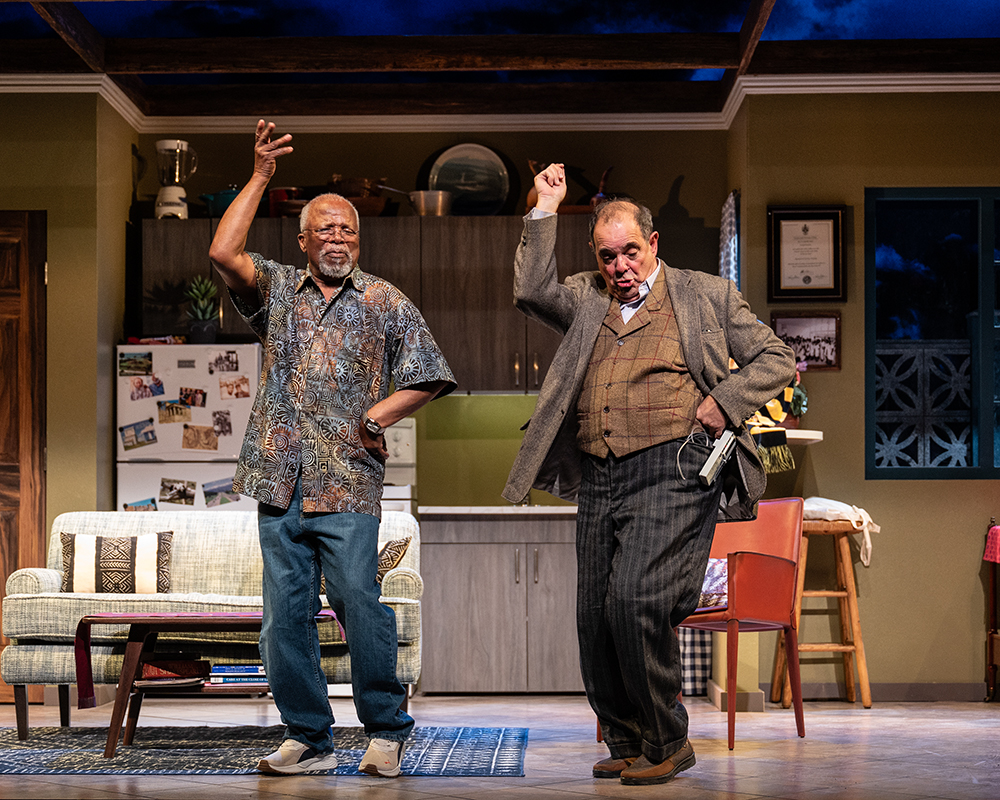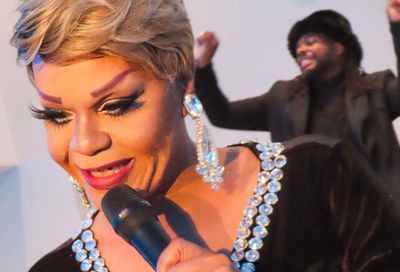Theater Reviews: Woolly Mammoth’s “Gloria” and Folger Theatre’s “Macbeth”
Woolly puts forth a vicious comedy of office politics, while Folger offers stunningly unique version of "Macbeth"

There is a provocative kind of comment humming around Branden Jacobs-Jenkins’ Gloria (★★★), a play with a premise that might have been, as they say, ripped from the headlines. The controversy is not in his assumption that our casually brutal communities (online, in class, at work) — in which alpha snark and savvy decide who “belongs” and who doesn’t — put pressure on the psychologically fragile. It is his subtler suggestion that in breeding and feeding this culture of self-obsessed one-upmanship, we are far more deeply entwined in the violence erupting in our communities than we realize or would like to believe.
Whether one agrees wholly with Jacobs-Jenkins or not, his delivery is, as always, clever, devious, and unrelenting, in equal measures. Luring us in with a very funny take on a typical office of perpetually disgruntled, competitive and/or self-involved minions, Jacobs-Jenkins pulls the rug out and then returns for a second act in which he explores his more damning points. If his people originally seemed harmlessly charmless, now, in the aftermath of tragedy, they reveal something deep and insidious: the me-first ethos has not just survived the unimaginable, it has been fed by it.
But as important the subject and as interesting Jacobs-Jenkins’ take, the play must nevertheless work — as written and as delivered. Here, the end-result is somewhat mixed.
First is Jacobs-Jenkins’ choice to keep it rather too simple. He touches with only the broadest brush strokes the reasons for violence. It may be his eagerness to get to the psychology of the aftermath (and its relation to his characters as a whole), but it feels unconvincing. It’s hard not to reflect that the vast majority of us will endure conniving, bitchy office-mates without snapping.
The challenges continue with Jacobs-Jenkins’ tonal about-face in the second act. With a first act that runs like clockwork with its perfectly-pitched one-liners (at least until the violence), the pace of the second feels awkward by comparison. The care-free characters from the first act have all been irrevocably changed, fair enough, but their interactions now seem labored, the dialogue stilted, the monologues contrived. It may allow Jacobs-Jenkins to surface his messaging, but continuity is lost. Neither director Kip Fagan nor the actors, who brings such music to the first act, can surmount this hurdle, as committed as they may be.
These issues aside, a great cast makes for plenty of entertaining and compelling moments. Conrad Schott absolutely shines for his nuanced-to-perfection Dean (even if he struggles a bit with his post-traumatic version) and his brief but cleverly-drawn IT guy Devin. Also showing his chops in three very different characters is Justin Weaks, delivering some remarkable subtlety in just a few lines of dialogue. Oozing with comedy is Megan Graves’ Ani, who is at once guileless and ironic. Convincing and subtly amusing is Ahmad Kamal as Lorin, the beleaguered worker down the hall. He, of everyone, does the best with the post-traumatic Lorin of the second act.
More problematic is Eunice Hong as Kendra, the most scathing of the office-mates. This is a challenging role because Kendra must drive much of the comedy but also the lion’s share of Jacobs-Jenkins’ messaging on the toxic workplace. Hong almost gets it right, but the dance between being funny and being damaging never quite works. Still, she chews through her fast and furious patter with some stunning dexterity. As Gloria, Alyssa Wilmoth Keegan is similarly caught between playing it large enough to forward the arc versus finding authenticity. Ultimately — and this rests with Jacobs-Jenkins’ choice to keep her peripheral — the former wins and her woman ends up presenting more like a plot-mover, and a potted vision of the alienated and disturbed.
In her Nan, the pretend-nice, ruthless boss most of us have encountered in one form or another, Keegan shows her versatility in capturing this pampered woman. But the Starbucks monologue given to her by Jacobs-Jenkins is symptomatic of everything in the second act: as meaningful as the gist may be, people just don’t talk like this and the artifice undoes so much of what the first act built.
Finally, credit to set designer Misha Kachman for a clever kind of intimacy between employees and audience — and respect to Fagan for the care and craft in showing the violence through these sets.
As with any art that touches on topical tragedy, the questions must be: is this genuine? Are the choices justified? Even flawed, the answers here are yes.

IT TURNS OUT THAT 17TH-CENTURY playwrights and theater companies considered Shakespeare a lot less sacrosanct than we do today. Indeed, according to experts on the era, the Bard’s plays were routinely tweaked to meet the entertainment needs of the day’s audiences. Adapters liberally added music, songs and new dialogue all with a view to getting “bums on seats” with some “contemporary” punch.
Delivering one such adaptation — Sir William Davenant’s version of Macbeth — is the ever-inventive Folger Theatre under the imaginative hand of director Robert Richmond. Workshopped with scholars theatrical and musical, this production of Macbeth (★★★) is something of an exercise in historical authenticity, but with an eye to keeping it as fun and enthralling for a 21st century audience as it might have been to our 17th century cousins.
Thus, assuming their penchant for mannered, gesticulatory acting might be a bit much for two-odd hours, Richmond manages it with an interesting concept. Setting the play in London’s Bedlam asylum of 1666, it starts with the inmates staging Macbeth ostensibly to raise money. As they begin their play-within-a-play, grand gestures abound, and, for now, such an agitated style makes sense.
But before this can all get too much, Richmond invokes a bit of theatrical “magic” that saves the day. Riffing on the old superstition that a real murder was once committed during a staging of the play, his inmates suddenly emerge from their private hells and begin playing their roles for keeps. If there is something a tad fuzzy about the transition, the concept is brilliant: once 21st century restraint takes hold, the new intensity is palpable.
It’s a bold vision and it works on multiple fronts. The crude draperies of the asylum do double-time to suggest tapestries, caves and walls when the authentic action takes hold. What serves as the dingy, candle-lit dungeon of Bedlam transforms easily into the cavernous castles of a cold and wind-swept Scotland.
Working a little less convincingly are a few of the details added for color but somehow a tad out of step. The slow-motion scenes of inmate abuse and the fruitier moments of lusty rubs belong in an edgier piece, something with a darker soul — one that doesn’t feature the returning presence of an adorable child (a near-universal guarantee that nothing all that bad is going to happen).
Such quibbles would matter less — or perhaps makes more sense — if the dark tension inside the man at its center were fully realized. Unfortunately, although Ian Merrill Peakes is oh so very good in delivering his Macbeth, he is never quite great in revealing his ruined soul. Put another way, if his portrayal is well-conceived and intense, it never quite compels — there is no compulsion to understand what makes this man tick, nor what makes him fail. Matters are not helped by Peakes’ tendency to over-egg his vocalizations and continue the contrived gesturing long past the transition out of Bedlam. It’s too much of a good thing and it distracts.
All that said, much is salvaged in the good chemistry between this Macbeth and Kate Eastwood Norris’ Lady Macbeth. With Peakes’ modern haircut and Norris’ unapologetic American accent, they signal (if anachronistically) a believable couple. More importantly, Norris is powerfully convincing as the hovering, pressuring wife bursting with intelligence and urgency.
Working less well later — and this sits largely with Richmond — are Macbeth’s emotions towards his (now ailing) wife. One minute he is grabbing her angrily by the chin (with his new-found machismo), the next he is giving her a hasty grope (like a bizarre afterthought), the next he is asking after her with tenderness. By the time she succumbs to her madness and he delivers his heartfelt “brief candle” monologue, it’s all been too much chopping and changing.
Even with these challenges, the cast delivers plenty of wonderful moments. Louis Butelli as the warden-turned-Duncan steals every scene with his fluency and sinister charisma, while Andhy Mendez offers a sympathetic and quietly compelling Banquo. Chris Genebach is a powerhouse of energy and emotional commitment (though the louder he gets, the less effective). And mention must be made of Jeff Keogh who as Seyton offers much vocal color, and Rafael Sebastian who reveals much potential in the quivering intensity he brings to his post-transformation Malcolm. The witches (Rachael Montgomery, Emily Noel, and Ethan Watermeier), given more prominent roles, bring a memorable cohesion.
Suffice to say: be you scholar, aficionado, or simply up for a fun night’s theater, this entertains — whatever your century.
Macbeth runs to September 24 at Folger Theatre, 201 East Capitol Street SE. Tickets are $42 to $79. Call 202-544-7077 or visit folger.edu.
Gloria runs to September 30 at Woolly Mammoth Theatre, 641 D St. NW. Tickets are $20 to $69. Call 202-393-3939 or visit woollymammoth.net.
Support Metro Weekly’s Journalism
These are challenging times for news organizations. And yet it’s crucial we stay active and provide vital resources and information to both our local readers and the world. So won’t you please take a moment and consider supporting Metro Weekly with a membership? For as little as $5 a month, you can help ensure Metro Weekly magazine and MetroWeekly.com remain free, viable resources as we provide the best, most diverse, culturally-resonant LGBTQ coverage in both the D.C. region and around the world. Memberships come with exclusive perks and discounts, your own personal digital delivery of each week’s magazine (and an archive), access to our Member's Lounge when it launches this fall, and exclusive members-only items like Metro Weekly Membership Mugs and Tote Bags! Check out all our membership levels here and please join us today!


























You must be logged in to post a comment.